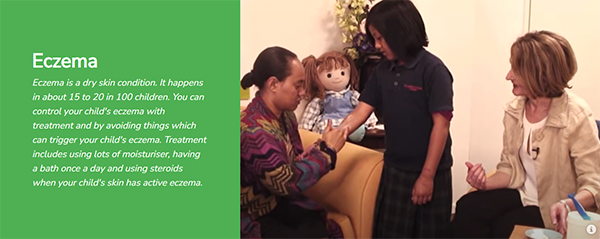Eczema & Food Allergy - Fast Facts
Eczema & Food Allergy - Fast Facts
Fast facts on eczema and food allergy - from clinical immunology and allergy specialists in Australia and New Zealand.
Fast facts
Eczema - a health condition that affects the skin
Eczema, also called atopic dermatitis, is a long-lasting (chronic) health condition that affects the skin. It causes redness, itching and sometimes infections. People with eczema often have other allergic conditions, including food allergy, but food allergy does not cause eczema.
Common triggers of eczema flares
When eczema gets worse, it is called an eczema flare. Common triggers of eczema flares include dry climate, overheating, exposure to irritants (such as sand or dirt), scratching, allergens (such as dust mite) and bacterial skin infections.
Managing eczema
You can manage eczema by maintaining, protecting and treating skin. Treatments may include:
- putting moisturiser on at least twice a day (avoiding those that contain food products)
- using a non-soap based wash or oil in the bath or shower
- avoiding soap and washes that produce bubbles or foam, which damage and dry out the skin
- avoiding known triggers (including foods if confirmed in rare cases) and irritants
- using anti-inflammatory creams and ointments, such as topical steroids
- treating bacterial skin infections with antibiotics, or using bleach baths (to prevent infection) if infections are frequent
- using medicines to reduce inflammation, if prescribed for severe eczema
Food allergy is more common in babies with eczema and a family history of allergy
Around 30% of babies in these groups develop food allergy compared to only 10% in the general population. There is some evidence that managing eczema well during infancy may reduce the chance of a baby developing food allergy.
When a child has eczema and food allergy, food allergy may trigger eczema, but is not the cause of their eczema
Most food allergy causes symptoms (including hives, vomiting and irritability) within 30 minutes of eating. Food allergy only occasionally results in delayed eczema flare ups.
Results of skin tests or blood tests for food allergy do not predict food(s) that are making the eczema worse
In New Zealand, a specialist doctor or nurse with training in allergy should recommend and interpret any food allergy tests that your child has.
Only try a 'food exclusion diet' if your child's eczema does not improve with treatment, and always with medical supervision
Before considering a 'food exclusion diet', follow the steps in 'Managing eczema well' above.
Confirming that food allergy is causing delayed eczema only needs short-term food exclusion. A health professional (doctor or nurse) with allergy training should always supervise food exclusion diets. If the specialist recommends continuing food exclusion longer term, children should also see a paediatric dietitian with specialised knowledge of food allergies.
Taking foods out of your child's diet without using the right substitutes (for good nutrition) can cause malnutrition and poor growth
Also, if your child has been regularly eating a food without signs of allergy, taking that food out of their diet can result in them developing a new allergy to that food.
See more KidsHealth content on eczema
This page last reviewed 07 December 2023.
Do you have any feedback for KidsHealth?
If you have any feedback about the KidsHealth website, or have a suggestion for new content, please get in touch with us.
Email us now
